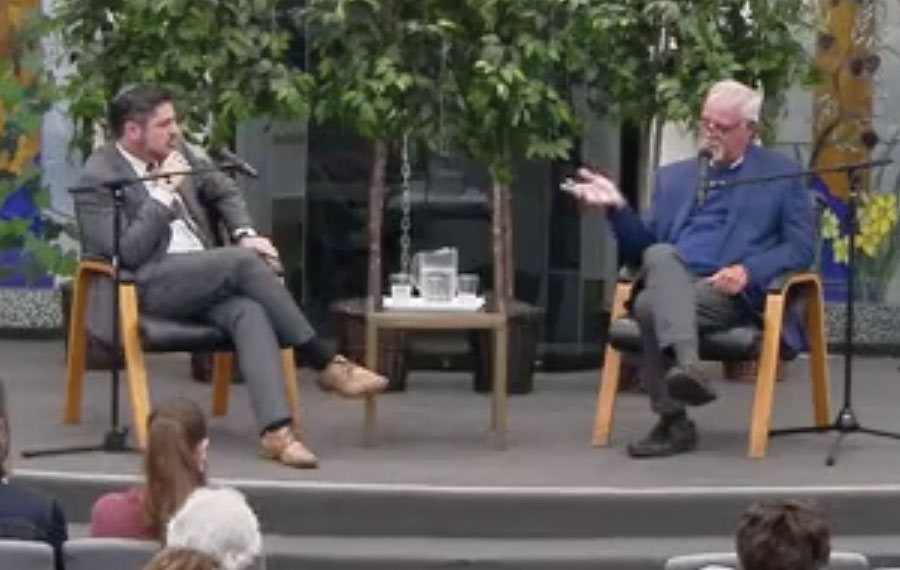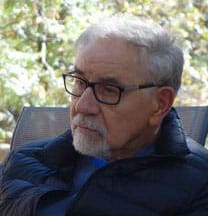 From left: Rabbi Noah Farkas and Steve Lopez at Valley Beth Shalom. Screen Capture from Live from Valley Beth Shalom
From left: Rabbi Noah Farkas and Steve Lopez at Valley Beth Shalom. Screen Capture from Live from Valley Beth Shalom After Los Angeles Times columnist Steve Lopez talked about homelessness at Valley Beth Shalom (VBS) on Jan. 22, several people approached him, wanting to talk one-on-one, as often happens when a celebrity appears in a public forum. Among them was a grizzled, ragged man smelling of urine, with cardboard tucked into his shoes.
Lopez treated this obviously homeless man with the same respect as everyone else who approached him. For Lopez, this was a fellow human being, rather than someone to be avoided.
Coinciding with the Los Angeles homeless count, Lopez was the featured speaker at the VBS event titled “Come Home: How We Win Against Homelessness,” hosted by Rabbi Noah Farkas, who also has chaired the Los Angeles Homelessness Services Authority (LAHSA).
Tall, bespectacled, with a gray goatee and thinning hair, Lopez, 66, is professorial in appearance but his personal style is similar to that of his writing: engaging, clear and down-to-earth. He’s a good listener with a keen eye for stories that he knows will stir his readers.
Lopez has been a journalist all his adult life but came to national prominence in 2005 after writing about Nathaniel Ayers, who had been on track to become a classical musician. Because of mental illness, Ayers’ life spun out of control. When Lopez met him, Ayers was homeless, living in Pershing Square and playing a violin that had two strings. Lopez wrote columns about his encounters with Ayers, which he then turned into a book titled “The Soloist.” The book was subsequently turned into a movie.
Because of his friendship with Ayers, Lopez said he started paying more attention to the thousands of homeless people “surrounded by all their belongings, disoriented, trying to stay alive. To be honest, I felt shocked and ashamed. People said to me, ‘Oh that’s been there forever, there’s nothing we can do about it,’ but that just didn’t sit right with me.”
In recent years Lopez has written often about people in desperate situations, whether they live on the street or in vehicles, hoping to move policymakers toward solutions.
He told the almost 500 attendees — mostly seniors — that a reader recently wrote to him about the closing of St. Vincent’s Medical Center near downtown, pointing out that the hospital is surrounded by homeless encampments. The reader asked Lopez if the now-empty hospital could be used as housing for people living on the street.
“It’s easy to get frustrated. It’s easy to get angry. I hope we don’t forget that some people are desperately ill and have been through hell, economic or otherwise. And they need our help.” — Steve Lopez
Lopez wrote about it in his column on Jan. 15, and said L.A. City Councilmember Mitch O’Farrell called him and told Lopez he was looking into the possibility. He then received an email from L.A. County Supervisor Hilda Solis’ office saying she also had been looking into it. Then, at the Jan. 21 L.A. County Supervisor’s meeting, Lopez said, “they voted unanimously to buy [St. Vincent’s] and to put it to use. They’re not sure exactly where the money’s coming from, but … it’ll be good to see if they can move that along.”
Lopez also said that housing “is unquestionably a great need but it’s become more and more obvious that we also need a huge investment in rehabilitation and drug treatment. It’s frightening seeing the degree to which meth is destroying people. People in their 20s and 30s are having heart attacks and strokes. The opioid crisis … people are dying …”
Lopez also offered a suggestion on how to obtain funding for homelessness programs. “When you sell a house,” he said, “why not a relatively small tax on the sale price, say one half of one percent? Call it a real estate transfer tax. … In a society with massive income inequality, it’s a way to give back without causing too much harm to people who have a lot of equity. … Government laws have benefited people who have plenty while other people have moved into vehicles or to riverbeds. So wouldn’t a real estate transfer tax be a place to balance the playing field just a little bit?”
When Lopez asked the audience to respond to this idea, he noted, by the applause, that half were for it and half against it.
Questions from the audience reflected commonly heard attitudes about homeless people. One person asked, “Aren’t there some who don’t want to get off the street?”
“There’s probably a small group who fall into that category,” Lopez said, “but most people on the streets would love to get off the streets.”
Another person asked if some homeless people choose not to work.
“This economy doesn’t work for everybody,” Lopez said. “I’ve written articles about people who work two or three jobs and still live in miserable conditions. Most people want to make it, but it’s very expensive to live here.”
Addressing people’s concerns about tents and trash close to where they live, Lopez said, “I understand that people in the community are concerned for their own welfare, as they should be. I think we have to balance interests and balance needs. If you’re a merchant and your customers don’t want to come to your store because of people on the street, that has to be taken into account.”
Lopez went on to say that L.A. Mayor Eric Garcetti “has wrestled with this, the clergy has also. The county’s wrestling with it and my fear is that we’ll lose our sense of compassion. It’s easy to get frustrated. It’s easy to get angry. I hope we don’t forget that some people are desperately ill and have been through hell, economic or otherwise. And they need our help.”





















 More news and opinions than at a Shabbat dinner, right in your inbox.
More news and opinions than at a Shabbat dinner, right in your inbox.